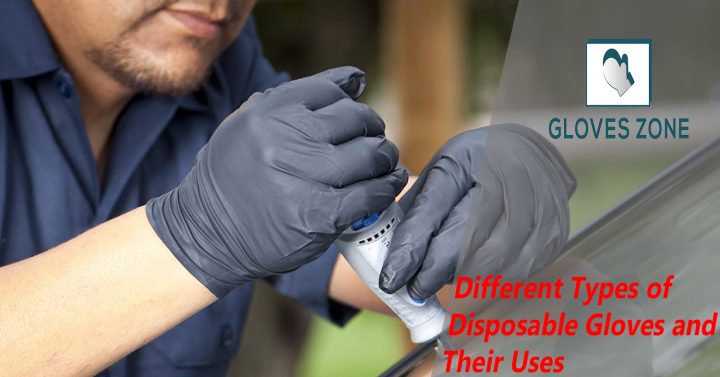Disposable Gloves are a great way to protect your hands while still being able to do work. There is no better feeling than getting home after a long day and not having to worry about washing your hands! They come in many different types, so it’s important that you know what type of gloves will be best for the job at hand. We’ll go over some of the most common types of disposable gloves and their uses below!
Types of disposable gloves & their uses
There are many different types of disposable gloves. We’ll go over some of the most common types below:
1. Nitrile Gloves
Nitrile gloves are perfect for protecting your hands from chemicals and other harsh substances. They’re also latex-free, which makes them a great choice for people with allergies.

Pros
- They’re thin and flexible, so they allow you to move your fingers without much restriction.
- They’re strong and durable, so they can withstand a lot of wear and tear.
- They’re resistant to chemicals, making them perfect for protecting your hands from harsh substances.
Cons
- They can be somewhat expensive compared to other types of disposable gloves.
Uses of Nitrile Gloves
Cleaning your hands after working with harsh chemicals.
Applying lotions or other substances to your skin, as nitrile gloves usually have pores in them that allow you to do so easily without having the substance get stuck under your nails.
Fixing up appliances around the house – They’re strong enough for tasks like this, but also thin and flexible enough so that you can still move your fingers easily.
Handling raw meat – Nitrile gloves protect your hands from bacteria and other contaminants that may be on the meat.
Uses for BBQ: You can use black nitrile gloves for BBQ
2. Polyethylene Gloves
Polyethylene gloves are perfect for people who have allergies to latex, as they’re made from a similar material. They’re also very affordable and easy to find in stores. These disposable gloves come in powder-free or powdered forms, so it’s important that you know which form is best for the job at hand before using them.

Pros
- They’re strong and durable, making them resistant to wear and tear.
- They’re affordable compared to other disposable gloves. This can be great if you need a large quantity for different applications!
Cons
- The powdered versions may cause allergic reactions in some people.
- They’re not as resistant to chemicals and other harsh substances as nitrile gloves are.
Uses of Polyethylene Gloves
- Cleaning up after pets: The gloves are durable enough to withstand the mess, but also affordable in case you need a lot of them.
- Handling food: The gloves are affordable and easy to find, making them a great choice for people who need disposable gloves for food handling.
- Handling hazardous materials: The gloves are strong enough to protect your hands from harsh chemicals and other harmful substances.
- Working in the garden: Polyethylene gloves are perfect for protecting your hands against dirt, bacteria, and other contaminants that may be in the soil.
- Handling glass: The gloves are strong enough to protect your hands from cuts, and the vinyl material is resistant to scratches.
3. Vinyl Gloves
Vinyl gloves are another great choice for people who have latex allergies. They’re also resistant to a variety of harsh chemicals, making them perfect for protecting your hands from harmful substances. Vinyl gloves come in both powdered and non-powdered forms, so it’s important that you know which form is best for the job at hand before using them.

Pros
- They’re very affordable, making them a great choice for people who need disposable gloves for multiple applications.
- They’re resistant to a variety of harsh chemicals, making them perfect for protecting your hands from harmful substances.
Cons
- They’re not as strong as nitrile or polyethylene gloves, so they may not be suitable for certain tasks.
Uses of Vinyl Gloves
- Handling hazardous materials: The gloves are resistant to a variety of harsh chemicals and other harmful substances, making them perfect for protecting your hands.
- Working in the kitchen: The gloves are affordable and easy to find, making them a great choice for people who need disposable gloves for food handling.
- Handling raw meat: Vinyl gloves protect your hands from bacteria and other contaminants that may be on the meat.
- Working with plaster or concrete: The gloves are strong enough to protect your hands from rough materials, but also thin and flexible so that you can still move your fingers easily.
- Handling glassware: Vinyl gloves give you the protection needed for tasks like this without sacrificing dexterity.
4. Latex Gloves
Latex gloves are a great option for people who need disposable gloves for tasks that require a lot of dexterity. They’re also resistant to harsh chemicals and other harmful substances, making them perfect for protecting your hands from harm. Latex gloves come in both powdered and non-powdered forms, so it’s important that you know which form is best for the job at hand before using them.

Pros
- They’re very strong and durable, making them resistant to wear and tear.
- The gloves are thin enough that you can still move your fingers easily, while also being flexible enough to fit all sized hands nicely.
Cons
- They may cause allergic reactions in some people.
- The powdered versions may cause excessive sweating and increase the risk of latex allergies.
Uses of Latex Gloves
- Handling hazardous materials: The gloves are strong enough to protect your hands from harsh chemicals and other harmful substances, making them perfect for protecting your hands.
- Handling glassware: Latex gloves give you the protection needed for tasks like this without sacrificing dexterity.
- Mechanics: Workers use disposable gloves for Mechanics.
- Preventing cross-contamination in a medical setting: Latex gloves are resistant to harmful bacteria, making them perfect for protecting your hands from diseases.
- Welding: Latex is especially good at preventing heat burns and other injuries caused by welding torches or hot metals.
- Delicate work that requires a great deal of manual dexterity: The thinness of the latex gives you more control over small objects.
- Touching items that may contain bodily fluids: Latex gloves can help protect you from diseases and other contaminants.
- Gardening: Latex gloves keep your hands clean and protected when working with soil or plants.
5. Neoprene Gloves
Neoprene gloves are a great option for people who need disposable gloves to protect their hands from harsh chemicals. They’re also resistant to many substances, making them more durable than vinyl or latex options. Neoprene is natural oil-, mildew- and water-resistant, so these gloves can even be submerged without losing their protective properties.

Pros
- The gloves are thick enough that you can still move your fingers easily, while also being flexible enough to fit all sized hands nicely.
- They’re resistant to a variety of harsh chemicals and other substances.
Cons
- They’re not very resistant to heat, so they may not be the best option for welding or other hot work.
Uses of Neoprene Gloves
- Working with plaster or concrete: The gloves are strong enough to protect your hands from rough materials, but also thick and flexible so that you can still move your fingers easily.
- Handling glassware: Neoprene gloves give you the protection needed for tasks like this without sacrificing dexterity.
- Preventing cross-contamination in a medical setting: Neoprene gloves are resistant to harmful bacteria, making them perfect for protecting your hands from diseases.
- Welding: Neoprene is especially good at preventing heat burns and other injuries caused by welding torches or hot metals. Loking for the best stick welding gloves don’t try neoprene gloves.
- Delicate work that requires a great deal of manual dexterity: The thickness of the neoprene gives you more control over small objects.
- Touching items that may contain bodily fluids: Neoprene gloves can help protect you from diseases and other contaminants.
- Gardening: Neoprene gloves keep your hands clean and protected when working with soil or plants.
FAQ
Are gloves one size fits all?
No, disposable gloves come in a variety of sizes to fit your hand perfectly. They’re usually available in small, medium, and large options so that you can find the perfect match for you. Make sure that when looking at glove sizing information online or on the packaging that it is referring to measurement across the palm, not just the length of your hand.
Are there any other material options?
You can also find gloves made from vinyl or nitrile materials instead of latex if you have an allergy to rubber products. Vinyl is very similar to latex in terms of having great dexterity and durability, but it doesn’t contain natural rubber latex proteins which can cause allergic reactions in some people.
Nitrile gloves are made from synthetic rubber and offer great resistance to many harsh chemicals, making them a good option for those who need gloves for chemical exposure. They’re also thinner than latex or vinyl gloves, giving you more dexterity when working with small objects.
Can I use gloves at home?
Yes, disposable gloves have many uses around the house as well! You can use them to handle hazardous chemicals or materials that may be dirty. They’re also good for protecting your hands from any germs you might come in contact with while cleaning.
Conclusion
Disposable gloves come in a variety of materials to fit your needs, whether you need protection from harsh chemicals or allergies to latex. Make sure to read the sizing information carefully before making a purchase so that you get the perfect fit for your hands

I am not a good blogger but I started blogging when I was in my college. one day scrolling my social media pages and top of the page one notification was coming like this “ earn money from blogging”.then I clicked that notification. After that, I was confused that which niche is better for me. Finally, I selected the niche and I was comfortable with that glove’s reviewer.

